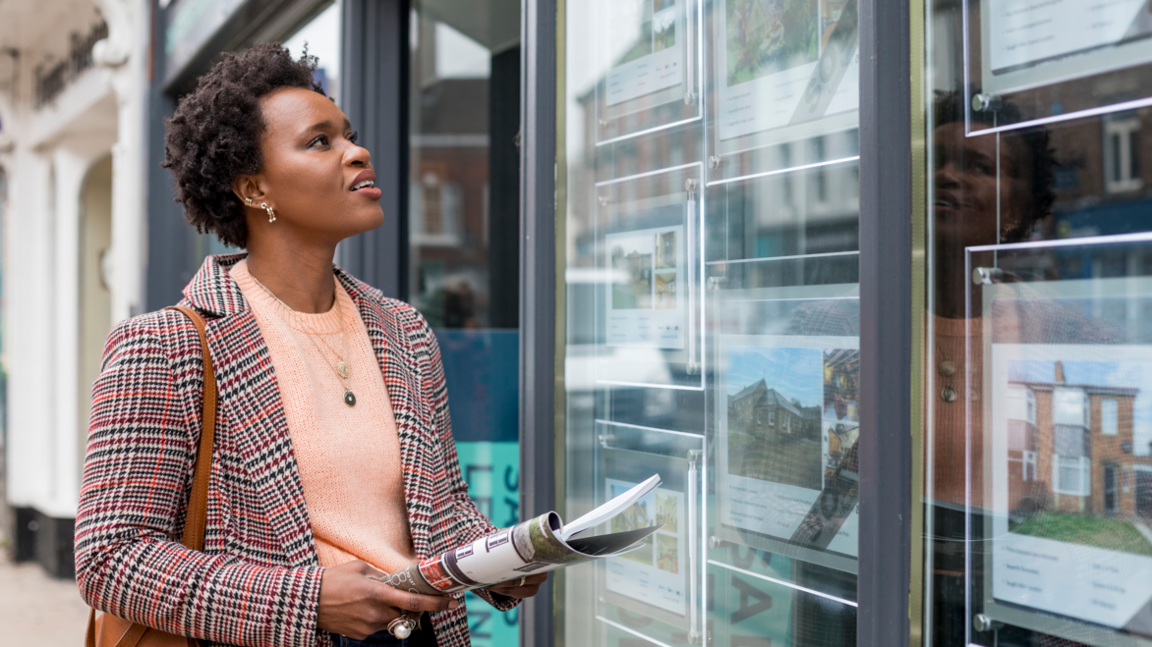UK house prices in surprise rise in May

- Published
UK house prices returned to growth in May after rising by 0.4%, according to Nationwide, as buyers' confidence was buoyed by wage growth and lower inflation.
The average house price reached £264,249 this month, compared to £261,962 in April, the building society said.
Mortgage rates in the UK have been comparatively high because the Bank of England is not forecast to cut interest rates as quickly or as steeply as initially predicted at the beginning of this year.
May's gain reverses a 0.4% drop in the previous month.
Andrew Harvey, senior economist at Nationwide, said: "I think we have been a little surprised actually by the resilience in the market because those affordability pressures have been quite significant."
Why mortgage rates are going up, not down
- Published5 May 2024
'I had no choice but to get a 35-year mortgage'
- Published19 May 2024
Over the year to May, house prices rose by 1.3%, said Nationwide. That compares to 0.6% growth in the 12 months to April.
The building society said that consumer confidence had "improved noticeably over the last few months, supported by solid wage gains and lower inflation".
An average two-year fixed rate mortgage is currently 5.92%, according to Moneyfacts, the financial information firm. That compares to 5.83% in April.
The rate on the average five-year fixed mortgage is 5.49%, up from an average of 5.4% last month.
Sarah Coles, head of personal finance at Hargreaves Lansdown, said that high house prices are a barrier for many buyers because "when coupled with higher mortgage rates, the monthly payments are pushed out of reach".
But she said: "Buyers are pushing through, which owes an awful lot to people's confidence in their own personal financial position.
"The easing of inflation, coupled with robust wage growth, and relatively low levels of unemployment, mean people are feeling more secure."
The latest figures from the Office for National Statistics showed that average pay, excluding bonuses, rose by 6% between January and March.
Interest rates
The Bank of England will announce its next interest rate decision on 20 June. It has kept borrowing costs at 5.25% since last year. The Bank has a target to keep inflation at 2%.
Mr Harvey said that while headline inflation has been slowing - down to 2.3% in the year to April - "it is a complicated picture".
One measure of inflation that the Bank of England looks at when it considers rate cuts is the services sector, which includes areas such as education and hospitality and gives a snapshot of pay growth and unemployment numbers.
That measure of inflation has failed to slow as much as the headline figure, dipping only marginally to 5.9% in April.
Mr Harvey said: "Some of the underlying pressures of price inflation, such as in the services sector, they are still stubbornly high.
"That is one of the reasons that the Bank of England are perhaps not quite ready to cut interest rates just yet because those pressures are still there and they are still very aware of the impact they could have.”
In compiling its figures, Nationwide looks at its own mortgage lending and does not include cash buyers or buy-to-let deals.
Cash buyers account for about a third of housing sales.
The building society said that with the general election coming up on 4 July, it had analysed house price movements around previous general elections and concluded that there was no significant effect.

Ways to make your mortgage more affordable
Make overpayments. If you still have some time on a low fixed-rate deal, you might be able to pay more now to save later.
Move to an interest-only mortgage. It can keep your monthly payments affordable although you won't be paying off the debt accrued when purchasing your house.
Extend the life of your mortgage. The typical mortgage term is 25 years, but 30 and even 40-year terms are now available.